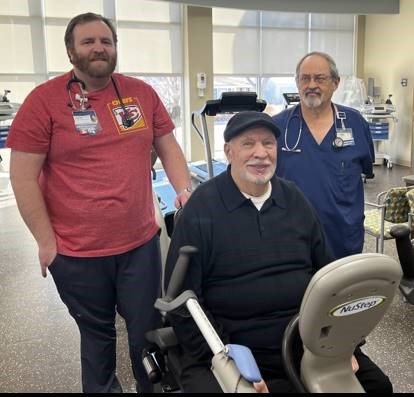After it was discovered that Jack Stewart’s aortic valve was functioning at only 20 to 40 percent efficiency, a valve-replacement surgery was performed last year.
Today, the 74-year-old Larned man is “living a much more active lifestyle and enjoying life much more.”
Stewart gives much credit for his recovery and positive prognosis to Cardiac Rehab services at Pawnee Valley Community Hospital (PVCH), 923 Carroll. He shared his story in observance of American Heart Month in February.
“I acknowledge I was somewhat skeptical about rehab at first but soon realized the benefits,” Stewart said. “I really appreciated the professional way I was treated, as well as the attention to detail and dedication to each patient to accomplish their goals.
“These Cardiac Rehab professionals not only help you meet your immediate goals but also develop a plan to attain future heart-healthy objectives.”
Stewart noted his appreciation to Dusty Thacker, PVCH director of Cardiopulmonary Services, and Wayne Wilcox, registered respiratory therapist.
From June 20 to Sept. 2 last year, this team guided Stewart through a rehab regimen that included exercises involving the Nu Step bike and the arm ergometer.
“I truly appreciate the time this great team spent with me,” Stewart commented. “They made each visit to rehab fun and full of laughter, while maintaining an atmosphere of professionalism. Rehab is not always fun but they made it fun for me. I would recommend our hospital’s Cardiac Rehab to anyone.”
Thacker noted that Stewart “was a model patient. He was always on time and eager to start exercising. Jack also was interested in the education we provided. Patients such as Jack make it easy to come to work every day.
“Most people think of Cardiac Rehab as just exercise,” Thacker added. “While it is a big component, rehab is so much more. It includes education and resources to help you make heart-healthy choices, along with emotional support.”
Benefits include strengthening the body, reducing the risk of hospital re-admission, and improving quality of life and mental health.
Cardiac Rehab cares for patients with varied diagnoses. The team supports those who have had open-heart surgery such as a coronary bypass graft, valve replacement and even a heart transplant.
“We see patients that have less invasive procedures too,” Thacker noted. “These include a transcatheter aortic valve replacement and angioplasty, which involves stent placement. Those with heart failure may also qualify for rehab.”
Cardiac Rehab usually sees patients on Mondays, Wednesdays and Fridays. Depending on the circumstances, rehab can last for 12 to 18 weeks.
“If a patient is uneasy about what to expect, we do our best to ease their worries and answer their questions,” Thacker said. “This usually starts with a phone call. After they come for the initial intake and first session, they usually feel better.
“And once they meet our respiratory therapists and patient-care coordinators, they really get to see what the program is all about. Most are happy to continue with rehab.”
In some cases, patients believe they can perform rehab on their own. “However,” Thacker noted, “they usually come around after they experience firsthand the education and resources available to them.”
Pawnee Valley Community Hospital, 923 Carroll in Larned, is a 25-bed facility, offering many services not typically available in a smaller facility. Included are 24/7 emergency care; acute, skilled and specialized nursing; surgery; high-tech imaging and laboratory tests; wound care; rehabilitation; and sleep and diagnostic center. The Pawnee Valley Medical Associates clinic, 713 W. 11th, provides the full range of family-medicine services; physician-assisted weight loss; and women’s health services. The hospital’s number is 620-285-3161; the clinic’s number is 620-804-6007.





